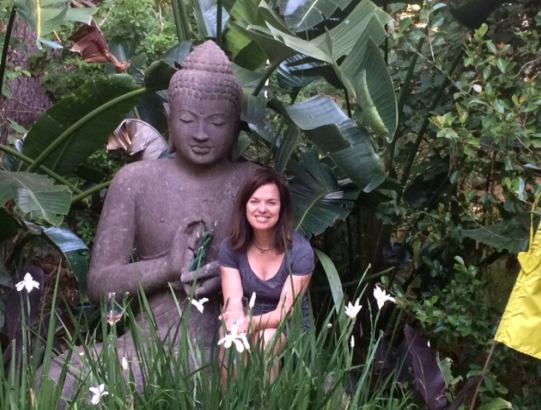
Yoga course, tips and inspiration
Laying the Foundation for your health… I have focused this newsletter on vibrational energy and health. Prana (life-force) is the common
Ayurveda Health Auckland, New Zealand
With spring upon us it is the perfect time to shake off the winter heaviness and recalibrate and invigorate our bodies. Our bodies naturally detox every day however with the large number of toxins we are exposed to daily through pollution, insecticides, alcohol, coffee, processed foods our bodies get overloaded.
The practice of cleansing is considered a vital part of an Ayurvedic lifestyle. It provides a means to clear accumulated waste and toxicity that can accumulate in the tissues compromising our health Panchakarma which is the Ayurveda cleansing and detoxing technique is often recommended.
The idea is that through the five actions of purgation, laxative therapy, herbal and oil enemas, the ama or toxins are driven back into the gastro track, and from there expelled from the body. It is a fairly strong and active treatment and and ideally should be done in a clinic where you can relax and focus your whole attention on the process.I t is not always necessary to go to this extreme, as you do need money and time, to take on a full Panchakarma.
There are less intense detoxes (including a milder form of Panchakarma) that can be recommended dependent on your lifestyle . I tend also to use a naturopathic detox that is high in protein and uses herbs and nutrients to support all three phases of detoxification.
Detox is particularly recommended in spring, because in the spring, your body’s natural cleansing and rejuvenating mechanisms kick into high gear, in tune with all of nature. Health is much more than an absence of a definable disease. Often we have forgotten what it feels like to be well and vital. A detox is a good start in the right direction. If you wish to discuss what detox could be right for you email me on perry@ayurvedahealth.co.nz. You will get added benefit if this is personalised to you.
Recipe – Kitchari
Ayurveda physicians often prescribe a kitchari diet before, during, and after panchakarma, to restore systemic balance. Kitchari provides nourishment while allowing the body to devote energy to healing. The grains provide the protein, the and spices kindle the digestive fire, that is often weakened by poor food combinations.
You can safely subsist on kitchari anytime in order to build vitality and strength as it helps balance all three doshas. For restless vata, the warm soup is grounding; for fiery pitta, its spices are calming; and for chilly kapha, it provides healing warmth.
1. First, rinse one cup of split yellow mung beans and soak for several hours. Set aside.
2. In a blender, liquefy one tablespoon of peeled, chopped ginger; two tablespoons of shredded coconut; and a handful of chopped cilantro with one-half cup of water.
3. In a large saucepan, lightly brown one-half teaspoon cinnamon; one-quarter teaspoon each of cardamom, pepper, clove powder, turmeric, salt; and three bay leaves (remove before serving) in three tablespoons of ghee, or butter.
4. Drain the mung dal and then stir it into the spice mixture, in the saucepan.
5. Next, add one cup of raw basmati rice. Stir in the blended spice and coconut mixture, followed by six cups of water.
6. Bring to a boil, cover, and cook on low heat for approximately 25 to 30 minutes until soft.
Mental Detox
I am using the natural inclination for “spring cleaning” to abide to that saying “less is more” trying to de clutter my life and home from all the excessive stuff that I seem to have accumulated. My husband is a minimalist when it comes to stuff, and has been a good influence on me reducing my need to consume (as was my habit). My wardrobe though still looks very abundant …
I like the saying that we should remove everything from our homes that cannot be used and that does not give us pleasure to look at.
That is my challenge for October. Do you want to join me?
Chyavanprash
Chyavanprash is an amazing formula that has been used for over 3000 years in Ayurveda to boost immunity, strengthen the body, providing energy and vitality. It is a type of herbal jam made from a base of amalaki fruit, a rich source of antioxidants.
In one study, it was shown to increase the macrophage activity and their number, indicating enhancement of non-specific immune response and reduction of chances of infection.
Chyavanprash is an excellent method for daily herbal consumption due to its unique constituents of cane sugar, ghee and honey. These nourishing tastes play the important role of “carriers” that allow the herbs to penetrate deep into the tissues. Great for convalescence and respiratory conditions.
In a small daily dose (1 or 2 teaspoons), it makes for a tasty and very healthful treat. This tridoshic formula stimulates metabolism and enkindles the digestive fire without aggravating pitta. It balances vata and kapha while strengthening the body against the effects of a stressful lifestyle.
Upcoming Events
6-week course at the Yoga Tree Takapuna
Starting Wednesday October 19th – time 7 to 8 pm
Restorative yoga is a slower-paced form of yoga. It takes a healing, meditative approach and is a true antidote to our hectic pace of life. Give yourself the time to slow everything down for an hour– you will feel the benefits.
The benefits: increased focus, stress relief, better sleep, pain reduction, and more.
Book through The Yoga Tree – amanda@theyogatree.co.nz

Laying the Foundation for your health… I have focused this newsletter on vibrational energy and health. Prana (life-force) is the common

Newsletter – November/December 2016 Living according to the season – the summer months How I love summer. The sun is out,